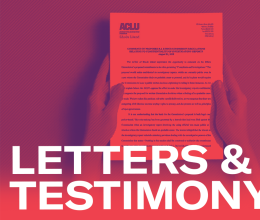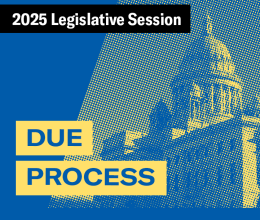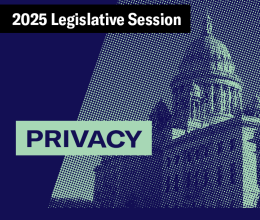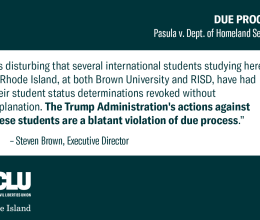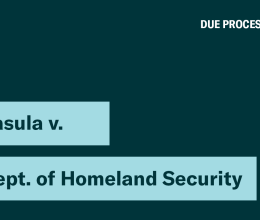For the third time in as many years, cooperating attorneys for the ACLU of Rhode Island have filed a class-action lawsuit related to the state’s troubled UHIP computer system. This latest suit, filed in U.S. District Court by ACLU cooperating attorneys Ellen Saideman and Lynette Labinger, challenges the adequacy of notices sent by the state Department of Human Services (DHS) to some SNAP recipients, demanding that they reimburse the state for benefits overpayments that they purportedly received years earlier.
The plaintiff, Woonsocket resident Carmen Correa, obtains SNAP benefits for herself and her thirteen-year-old niece. She recently received a notice from DHS demanding that she repay $1,925 in benefits that the agency claims were allegedly overpaid to her more than four years ago. The only explanation given was that the overpayment was due to “Agency Error.” While the notice advised Correa of her right to a hearing to contest DHS’s determination, the lawsuit argues that it “does not contain sufficient information to allow a reader to determine whether the overissuance is correct or whether Plaintiff has grounds to contest it.”
The Department’s efforts to recoup alleged overpayments were halted a few years ago as a result of the enormous problems of inaccuracy and untimeliness with benefits that occurred in 2016 when UHIP went online. The ACLU filed a class-action lawsuit that year challenging the UHIP system’s systemic failure to provide tens of thousands of SNAP applicants the benefits they were entitled to in a timely manner, and that suit was finally settled only two months ago. Citing those “long-standing problems of the UHIP program,” the suit claims there is a “very high probability that the data used to determine alleged overpayments is erroneous.”
Correa was given a month to sign an overpayment agreement with the state or else face what the lawsuit calls “harmful” cuts to her SNAP benefits. If those cuts occur, the lawsuit claims that Correa “will have great difficulty feeding herself and her niece” and, unable to pay her bills, could have her utilities shut off. The suit points out that federal SNAP regulations require overpayment notices to “include the reason for the claim and an explanation of how the [amount] was calculated,” information missing from the notice to Correa. Unlike the current notices, the suit notes, overpayment notices that had been sent out in past years by the pre-UHIP computer system provided all the information required by the federal regulations.
The lawsuit argues that the inadequate notices violate the due process rights of Correa and all other SNAP beneficiaries receiving similar notifications. The suit seeks a temporary restraining order, and permanent relief, barring DHS from continuing to issue overisssuance letters “without adequate written notice” or from taking action against Correa or any other individuals based on the inadequate notices.
ACLU of RI cooperating attorney Saideman said today: “With DHS now seeking to recoup payments that were made years ago – back to 2014 for Carmen Correa – it is extremely important that the agency provide SNAP recipients the reason for the overpayment and how it was calculated. That knowledge will help SNAP recipients know if the agency has made another error and incorrectly determined an overpayment, and if they can contest the overpayment.”
ACLU of RI executive director Steven Brown added: “If the UHIP debacle has taught us anything, it is the importance of providing due process to SNAP recipients to ensure they receive the benefits to which they are entitled. It is therefore very distressing to see the state telling recipients that they owe money due to the state’s own errors, but then fail to explain how this determination was made. This is intolerably unfair and unacceptable, and we are hopeful the court agrees.”
More information on the case, Correa v. Hawkins, can be found here. Information about the ACLU’s previous UHIP-related lawsuits can be found here and here.



